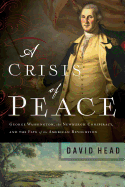
Following Britain's 1781 surrender to the Continental Army in the Battle of Yorktown, the American colonies rejoiced: independence and peace were near! History professor David Head (Privateers of the Americas) investigates why commander-in-chief George Washington and the Confederation Congress, however, feared a different result.
Plagued by complicated financial growing pains and a constant struggle to define itself as a unified government, Congress had been unable consistently to pay the army's soldiers through the grueling war. Officers and soldiers, worried that peace would see them returned to civilian life with no restitution for years of sacrifice, were brimming with resentment. They "believed in republican government and creating the world anew," but they also wanted to be honored and paid. As Congress continued to struggle, the possibility of mutiny grew, culminating in March of 1783 with the Newburgh Conspiracy. An inflammatory, anonymously written letter circulated through the military camp urging stronger demands of Congress, including a threat of military refusal to disband. With the revolution on the verge of self-destruction just months before the war's conclusion, it was only Washington's poise that kept the infant American nation from tearing apart, Head writes. "Washington understood his men and his country. In an hour of grave danger... Washington knew how to inspire his officers' perseverance by asking for their trust."
Head dissects the events leading up to and through the so-called conspiracy, tracking financial records, correspondences and congressional documents to paint a vivid picture of a newborn nation in crisis. Meticulous and balanced, A Crisis of Peace lays out the vitally important circumstances that led to a critical moment in our nation's history and Washington's indispensable role in preserving the peace. --Jennifer Oleinik, freelance writer and editor

